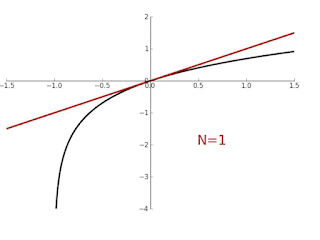Taylor's Theorem For Power Series
Taylor's Theorem For Power Series :
Statement :
Let ∞
Σ aₙ xⁿ be a power series with
n= 0
radius of convergence R , and let
∞
f(x) = Σ aₙ xⁿ , |x| < R
n=0
Then for any a∈ ]-R ,R[ , prove that f can be expanded in a power series about 'a' which converges for |x-a| < R- |a| , and
∞
f(x) = Σ f⁽ⁿ⁾(a) (x-a)ⁿ /n! , |x-a|<R-|a|
n=0
Proof :
Suppose |x-a|<R-|a|.
Then |x|≤|x-a|+|a|<R and thus Σaₙxⁿ converges .
∞ ∞
Now , f(x) = Σ aₙxⁿ = Σ aₙ(x-a + a)ⁿ
n=0 n=0
∞ n
= Σ aₙ Σ ⁿCₘ aⁿ⁻ᵐ(x-a)ᵐ ......(1)
n=0 m=0
We wish to change the order of summation in this expression . To prove its validity we notice that it is the summation by rows of double series , which if convergent absolutely , will converge by columns as well to the same sum .
Replacing all quantities by their moduli and taking all terms with positive sign , expression on the right of (1) gives
∞ n
Σ |aₙ| Σ ⁿCₘ |aₙ|ⁿ⁻ᵐ|x-a|ᵐ
n=0 m=0
∞
= Σ |aₙ|(|x-a|+|a|)ⁿ
n=0
which is a power series and converges , since |x-a|+|a|<R .
Hence , for |x-a|<R-|a| , change in the order of summation is justified and so
∞ ∞
f(x)= Σ { Σ ⁿCₘ aₙaⁿ⁻ᵐ} (x-a)ᵐ ......(2)
m=0 n=m
This is the required result , but for the coefficients which we shall now express in terms of the values of f and its derivatives at a point .
We know
f(x) =a₀+a₁x+a₂x²+...+aₘxᵐ+...+aₙxⁿ+..
∴ f⁽¹⁾(x)=a₁+2a₂x+3a₃x²+..+maₘxᵐ⁻¹+
..+naₙxⁿ⁻¹+....
f⁽²⁾(x)= 2!a₂+3.2a₃x+..+m(m-1)aₘxᵐ⁻²+..
+n(n-1)aₙxⁿ⁻²+...
..............................................................
f⁽ᵐ⁾(x)= m!aₘ+ (m+1)m(m-1)..3.2aₘ₊₁x
+..+n(n-1)..(n-m+1)aₙxⁿ⁻ᵐ+...
= m![aₘ+ ᵐ⁺¹Cₘaₘ₊₁x+ᵐ⁺²Cₘaₘ₊₂x²+...]
∞
Then |x|≤|x-a|+|a|<R and thus Σaₙxⁿ converges .
∞ ∞
Now , f(x) = Σ aₙxⁿ = Σ aₙ(x-a + a)ⁿ
n=0 n=0
∞ n
= Σ aₙ Σ ⁿCₘ aⁿ⁻ᵐ(x-a)ᵐ ......(1)
n=0 m=0
We wish to change the order of summation in this expression . To prove its validity we notice that it is the summation by rows of double series , which if convergent absolutely , will converge by columns as well to the same sum .
Replacing all quantities by their moduli and taking all terms with positive sign , expression on the right of (1) gives
∞ n
Σ |aₙ| Σ ⁿCₘ |aₙ|ⁿ⁻ᵐ|x-a|ᵐ
n=0 m=0
∞
= Σ |aₙ|(|x-a|+|a|)ⁿ
n=0
which is a power series and converges , since |x-a|+|a|<R .
Hence , for |x-a|<R-|a| , change in the order of summation is justified and so
∞ ∞
f(x)= Σ { Σ ⁿCₘ aₙaⁿ⁻ᵐ} (x-a)ᵐ ......(2)
m=0 n=m
This is the required result , but for the coefficients which we shall now express in terms of the values of f and its derivatives at a point .
We know
f(x) =a₀+a₁x+a₂x²+...+aₘxᵐ+...+aₙxⁿ+..
∴ f⁽¹⁾(x)=a₁+2a₂x+3a₃x²+..+maₘxᵐ⁻¹+
..+naₙxⁿ⁻¹+....
f⁽²⁾(x)= 2!a₂+3.2a₃x+..+m(m-1)aₘxᵐ⁻²+..
+n(n-1)aₙxⁿ⁻²+...
..............................................................
f⁽ᵐ⁾(x)= m!aₘ+ (m+1)m(m-1)..3.2aₘ₊₁x
+..+n(n-1)..(n-m+1)aₙxⁿ⁻ᵐ+...
= m![aₘ+ ᵐ⁺¹Cₘaₘ₊₁x+ᵐ⁺²Cₘaₘ₊₂x²+...]
∞













Comments
Post a Comment
If Any Doubt Ask Me